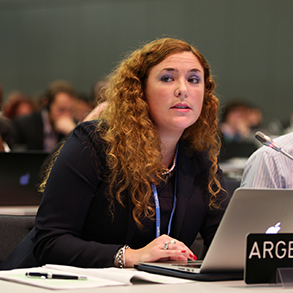
Adaptation negotiator for Argentina, and Co-Chair of the Adaptation Committee (2018-2019)
Pilar led the G77 negotiations on adaptation, facilitated the discussions on the Adaptation Fund serving the Paris Agreement, and chaired the Adaptation Committee before and during the 2018 Climate Conference in Katowice – all while she was pregnant with her daughter.
“I didn’t want my pregnancy to be seen as either a sign of weakness or of strength,” she says. “But I learnt a lot about myself – why I was there, what I was fighting for, and of course, the limitations of my own body.”
Pilar joined her country’s delegation to the UNFCCC in 2013, a particularly difficult point in the climate negotiations when the Paris Agreement was being negotiated. She came with a PhD in International Relations and experience in negotiating environment and sustainable development treaties in South America, so the negotiating part came naturally to her. The specifics of the climate negotiations took more time. “I wanted to focus on adaptation because I thought it is a key issue for my country, but because my country wanted me to, and for the sake of coherence, I also followed all the other key issues such as mitigation, transparency, and the global stocktake.”
As Co-Chair of the Adaptation Committee from 2018-2019 and G77 lead on adaptation, Pilar travelled first to Bonn with her two-month-old daughter Esperenza (“hope”), and then a few months later to the 2019 Climate Conference in Madrid. That’s when she experienced first-hand the challenges that climate conference venues pose to new mothers. “It was the most challenging time of my career. I managed to do it because of the support of my family, and because of the help from the UNFCCC secretariat staff, who made their office available for me to feed my baby.”
Pilar said she chose to take her baby to the Conference so that she could do her job – and she was lucky to have a choice. “Other women negotiators don’t have a choice, and could lose their job if they can’t travel to a meeting because of family responsibilities.”
She also realises that it’s not only pregnant or new mothers who face challenges. Every stage of parenthood comes with a new set of challenges, for both women and for men. There is very little discussion on how these challenges can be addressed within the process, she says, and she hopes the Network can find ways to raise and discuss them. In addition, she sees a role for the Network in supporting women in their journey of understanding the negotiations, developing their own style and personality, and taking up leadership roles under the UNFCCC – and beyond. “It is not just about the negotiations, but also about implementation on the ground, and – critically – about monitoring and evaluation to ensure that progress is achieved.”
Having a sorority for support can help women identify their own strengths and develop new perspectives in addition to their own personalities, says Pilar. “We need new people with fresh ideas, to avoid the same people saying the same things over and over again, with the same lack of result. Women don’t have to do things the way they were done in the past, ways that have proven ineffective. They should build their own understanding of strength and power, instead of borrowing from the male perspective, of how to approach situations with more openness, dialogue, inclusion, clarity, and transparency. Every single actor, big or small, matters, and you need to represent everyone when you are in a leadership position.”
She feels the Network can also help to understand and change the current situation, where gender parity exists on some issues negotiated under the UNFCCC, such as adaptation, but others such as finance, technology, and mitigation are still male dominated.
Pilar recognizes that different countries and regions are in different stages when it comes to gender issues. Whereas women still face challenges in the workplace in Latin America, she says there are strong movements in place to push for parity. It may not be the same in other countries and regions, and the Network can support change.
After working with the Ministry of Foreign Affairs and the Ministry of Environment in Argentina, Pilar has returned to her birth city of Rosario, where she work in Argentina’s National Scientific and Technical Research Council (CONICET), as well as teach at the National University of Rosario. She continues to collaborate with both ministries on the negotiations, while teaching graduate and post-graduate students, and researching and writing on Argentina’s foreign policy on climate change. In her free time, she likes to dance (“flamenco, salsa, and tango – I love to dance!”), sing in the church choir, and play the piano.
“While multilateralism can’t solve everything, it definitely offers a better chance of progress. Particularly to those who are still struggling to understand what climate change means for their countries.”